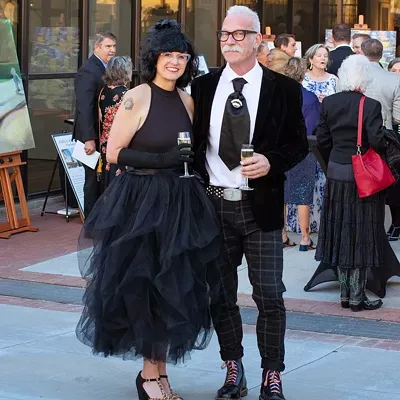When Israel Horovitz wrote his play Lebensraum in 1996, he could have had no idea that it might become a cautionary tale for the 21st century.
His play is a pre-millennial fantasy about what might happen if a German chancellor invited six million Jews throughout the world to come "home" to Germany in an attempt to make reparations for the Holocaust, in which six million Jews were killed and countless others displaced. How could he have known that a mere two decades into the new millenium, his country could be so divided in very ugly ways about issues of immigration, religion and nationality—about the diversity that has always been a hallmark of the American promise of freedom?
Then again, Horovitz had observed the behaviors of that most enigmatic of creatures, the human being, and knew of this creature's propensity to wage wars over differences and suspicions and the need to be "right." He knew that tolerance would always have to be defended.
That's why his play, now onstage at the Invisible Theatre, is quite sobering.
Lebensraum is a dense little play. (The title is the German word for "living space.") After establishing the context of a Jewish "homecoming," the play weaves together two primary stories. One looks at the consequences for an American family that decides to accept the chancellor's offer, and the other focuses on a character's homecoming to exact revenge on one who had betrayed his family many years earlier. The stories are woven together with the help of the actors' addressing the audience directly to fill in details and to flesh out the segments we actually see.
Remarkably, only three actors—David Alexander Johnston, Lucille Petty and Steve Wood—deliver the characters and the commentary. They slip easily in and out of their roles, from character to narrator to another character. This is no easy feat, and less skilled actors could doom the production. Here, they bring it to life clearly and sympathetically.
Conflicts arise between the new citizens and the German natives. The American dock worker who has migrated is given a job and title that belonged to a German, who becomes angry and resentful, and that, in turn, leads to deadly violence.
Horovitz' play does a fair share of telling, not showing, and showing is what we usually want from a play. But it's not much of a problem here, chiefly because of the pacing of the production and the performers' skill. Director Susan Claassen and her cast make sure the story is told briskly. They also find the humor Horowitz has built into his play. For example, he gives us two altacockers, long-time friends who have landed in Australia after fleeing Germany a half century ago, kvetching and arguing about the chancellor's offer. One is intrigued; the other is highly skeptical. The humor really arises because both are played by one actor, here Johnston, aided by a mask, in a furious conversation with himself. It's truly funny and it creates a nice—and necessary—balance, lightening our load as we are being carried on what is really a very sober journey.
That mask is one of several used in the production. They were designed by Maryann Trombino, who also designed the costumes. They are half-masks made with soft material that allows realistic but exaggerated contours of the face, and they are mounted on a dowel that the actor can use to hold it, hiding a part of his face but also working in conjunction with his "real" face. It's a great, sometimes weird effect, and although a few times the actors words were muffled by a mask, that's an issue easy to correct.
Horovitz doesn't suggest an answer to the problems that arise in the absence of tolerance and a desire to build walls instead of bridges. He does give us a disturbing story of the inexorable consequences of such a lack of tolerance.
The piece concludes with the actors' delivering Horovitz' passionate exhortation to never let such human ugliness happen again: Nimmer Wieder. Lebensraum seems an unhappily relevant admonition.






